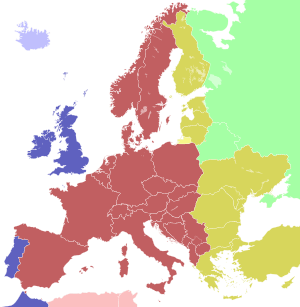Time in the United Kingdom

The United Kingdom uses Greenwich Mean Time or Western European Time (UTC) and British Summer Time or Western European Summer Time (UTC+01:00).
History
The United Kingdom used Local Mean Time until railway timetabling gradually established the two standards of Greenwich Mean Time and Dublin Mean Time (UTC-00:25, no longer used). These were officially adopted under the Statutes (Definition of Time) Act 1880 (43 & 44 Vict.).
Daylight saving time was introduced by the Summer Time Act 1916 (6 & 7 Geo. V), which was implemented in 1916 as GMT plus one hour and Dublin Mean Time plus one hour. The length of DST could be extended by Order in Council, and was extended for the duration of World War I. For 1916, DST extended from 21 May to 1 October, with transitions at 02:00 standard time. On 1 October 1916, Greenwich Mean Time was introduced to Ireland.[1]
At the beginning of the 20th century, Sandringham Time (UTC+00:30) was used by the royal household. This practice was halted by King Edward VIII, in an effort to reduce confusions over time.
The dates of British Summer Time are the subject of The Summer Time Act 1972.
From 1972 to 1980, the day following the 3rd Saturday in March was the start of British Summer Time (unless that day was Easter Sunday, in which case BST began a week earlier), with the day following the 4th Sunday in October being the end of British Summer Time.
From 1981 to 2001, the dates were set in line with various European Directives. Since 2002 the Act has specified the last Sunday in March as the start of British Summer Time with the last Sunday in October being end of British Summer Time. [2]
Experimentations with Central European Time
The United Kingdom experimentally adopted Central European Time by maintaining Summer Time throughout the year from 1968 to 1971.[3] In a House of Lords debate, Richard Butler, 17th Viscount Mountgarret said that the change was welcomed at the time, but the experiment was eventually halted after a debate in 1971, in which the outcome might have been influenced by a major accident on the morning of the debate.[4]
Proposals to adopt CET have been raised by various politicians over the years,[3][5] including a proposal in 2011 to conduct an analysis of the costs and benefits.[6]
Devolution
Authority over the time zone in Northern Ireland is devolved to the Northern Ireland Assembly[7] but the power has never been used. In Scotland and Wales, time zone is a reserved matter, meaning that (as in England) only the Parliament of the United Kingdom has power to legislate.
IANA time zone database
The IANA time zone database contains one zone for the United Kingdom in the file zone.tab, named Europe/London.
This refers to the area having the ISO 3166-1 alpha-2 country code "GB".
British territories
- UTC−08:00 — Pitcairn Islands
- UTC−05:00 — Cayman Islands
- UTC−04:00 (AST) — Anguilla, Bermuda, British Virgin Islands, Montserrat, Turks and Caicos Islands
- UTC−03:00 (FKST) — Falkland Islands
- UTC−02:00 — South Georgia and the South Sandwich Islands
- UTC (GMT) — main territory of the United Kingdom, Saint Helena, Ascension and Tristan da Cunha, Guernsey, Isle of Man, Jersey
- UTC+01:00 (CET) — Gibraltar
- UTC+02:00 (EET) — Akrotiri and Dhekelia
- UTC+06:00 — British Indian Ocean Territory
See also
References
- ↑ Myers J (5 October 2008). "History of legal time in Britain". Retrieved 15 July 2009.
- ↑ http://www.legislation.gov.uk/ukpga/1972/6
- 1 2 "Fresh attempt to change UK time". BBC News. 25 January 2007. Retrieved 19 January 2010.
- ↑ "Central European Time Bill [H.L.] HL Deb 11 January 1995 vol 560 cc243-84". Hansard. 1995. Retrieved 19 January 2010.
- ↑ "Tundra time call in clocks debate". BBC News. 23 October 2009. Retrieved 19 January 2010.
- ↑ "Plan to bring UK clocks forward". BBC News. 20 February 2011. Retrieved 20 February 2011.
- ↑ The Role of the Advocate General and its constitutional context, Office of the Advocate General of Scotland, speech delivered 18 March 2011, retrieved 1 January 2014, "For example, the Northern Ireland Assembly has the legislative competence to deal with time zones."
External links
| ||||||||||||||